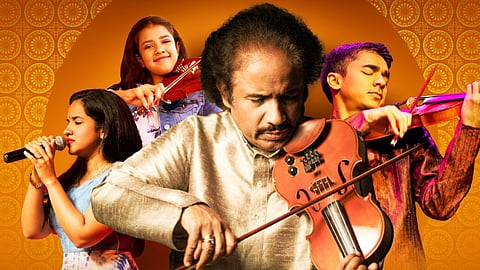
- LIFESTYLE
- FASHION
- FOOD
- ENTERTAINMENT
- EVENTS
- CULTURE
- VIDEOS
- WEB STORIES
- GALLERIES
- GADGETS
- CAR & BIKE
- SOCIETY
- TRAVEL
- NORTH EAST
- INDULGE CONNECT

Violinist, composer and conductor, Subramaniam Lakshminarayana or L Subramaniam is one of the most famous violinists in the world today. He has over 200 recordings to his credit, releasing several solo albums and recording collaborations with musicians like Yehudi Menuhin, Stéphane Grappelli and Ruggiero Ricci; and making albums and performing with Herbie Hancock, Joe Sample, Jean-Luc Ponty and George Harrison to name just a few. In India, he has accompanied highly regarded vocalists in carnatic music on stage including Semmangudi Srinivasa Iyer and M Balamuralikrishna. He has also written works for orchestras, ballets and Hollywood film scores and written books on music in addition to composing symphonies and carnatic pieces. The living legend performs at Nita Mukesh Ambani Cultural Centre this Saturday, September 14, and we caught up with him to find out more about the upcoming performance, Conversations with the Subramaniams.
Excerpts from the interview:
Can you tell us a little bit about what you’re going to be performing today at the Conversations with the Subramaniams show at NMACC ?
I do a lot of concerts with my wife Kavita (Krishnamurthy) but here I’m going to be performing with my daughter Bindu, my son Ambi and also my granddaughter Mahati. I also have fantastic musicians who have been playing with me for many years and they will be accompanying me. I’ve also invited a fantastic dancer from Spain with a background in ballet and flamenco.
You were one of the first artistes to bring in in the idea of fusion or international collaborations into the musical scene in the country — how did that journey begin?
It was all my father. If you see the early ’50s and ’60s, the Indian violin was basically an accompanying instrument. My father’s dream was to make the Indian violin heard all over the world and in major concert halls as a solo instrument. So, he created a lot of new techniques. I just followed in his footsteps.
You are still very much seen as the poster boy of the Indian violin across the world — have you seen western musicians look at the instrument differently recently?
Definitely. There’s a lot of change. A lot of the great artistes who are western violinists have now collaborated with me. A lot of violinists who have done a lot of work with the major orchestras have asked me if I could write a new piece for them and perform with them. The number of orchestral concerts I’ve done now is in the hundreds — with these orchestras playing my own music.
Looking at India specifically, what is your advice to younger violinists who are keen on taking up the Indian violin today?
So, there are two things which are very important. One is, you really have to work very hard to master the instrument, so that you will get the respect of other violinists from other parts of the world. Because, you see, an average or even an advanced student in the western form has a better technique than some of the most established violinists here. Technically we have to be solid to get mutual respect. Then only they will collaborate with you. Secondly, you should be open to learning the basics of western music.
Finally, audiences who appreciate classical music in India are constantly dwindling in number. Many of them feel carnatic and hindustani music is something they cannot relate to. How does one solve this?
We cannot blame the audience saying that this audience is not ready to listen to what I am playing. You are playing for them or you are singing for them. So, it is your duty to make sure that what you are trying to say, gets across. It’s like someone saying, “I’ll go and give a lecture and whether anybody listens to it or not doesn’t matter to me, I’ll just go and finish my job and come.” You want other people to hear and hopefully to understand you, so you have to come across with certain common points or ideas which will make some sense to them. We also have to train and give opportunities to youngsters or we won’t have anybody in the auditoriums soon.
Watch the interview on our YouTube channel and as a podcast on Spotify.
`750 onwards. September 14, 7.30 pm onwards.
At The Grand Theatre, NMACC, Mumbai.
Email: romal@newindianexpress.com
X: @elromal